Bonds and Revelations: The voices of a Mother and Daughter .JPG)
As we walk through one of the plazas in the small city of Loja, one of Ecuador´s smaller cities, something draws our eyes to a pair of womyn walking together, their eyes only focused on each other, their faces wearing a seriou expression. The first is a young womyn leaning on her crutches to support her body, the other an older womyn, her eyes waiting
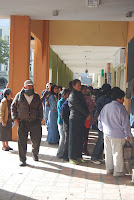.JPG)
for a response. Something about the way they walk, in the seemingly charged space around them, their faces and their focused attention, draws us near. We decide to introduce ourselves and the MUCOV Project and tell them we are ineterested in hearing about their lives. The womyn, as we find out, are mother and daughter; Leonor, 38 and Karina, 18. They look at one another and Leonor responds: “We would like to meet you ladies but right now we are discussing something very important. ” We immedeately feel that our intuition about the two womyn is justified. We arrange to meet with them the next morning, 9am sharp.
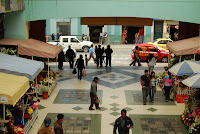
We met in Leonor´s house after a complicated planning. Karina is not allowed to visit her mom and so the meeting point was done without Leonor´s ex-husband´s approval. We push play and sit and listen to their voices. As they share their Herstories with us, we realize more and more how exceptional and strong both mother and daughter are, the creativity and faith with which they have faced so many difficulties in their lives: death, disability, injustice, seperation, abuse and discrimination. And more than anything, their connection seems to grow stronger as they confront the situations that life has abruptly brought to their fate´s door.
One of the tragedies that marked the lives of these two womyn, is the death of Francisco, Leonor´´s second son. Leonor had four children. Two of them, Karina and Francisco, were born with a physical disability they inherited from their father, also a disabled man. At the tender age of eleven Francisco died of a respiratory complication from a respiratory cardiac arrest, a complete shock for the whole family. On the Saturday of his death, Fransico was suffering from an acute stomach ache, and as the night wore on, he got sicker and sicker. Leonor was at a loss. Unaccastumed to asking anyone for help and new in the neighborhood, in her desperation to help her son she knocked on all of the neighbors doors, asking for advice and medicine. “I don´t sit around waiting for things to happen, I look for solutions.” But despite her best efforts, around 5pm Francisco expressed his last words of pain. On the way to the hospital, giving her son CPR, Leonor knew that death was near. Francisco died before reaching the hospital. It had only been weeks since Francisco had been able to walk without the need of crutches or a walker. “This was a total surprise to me,” expressed Leonor.
How could she survive his loss? “God sustained me at that time and he sustains now. I don´t always agree with everything my church and religion say but I know that God loves me becasue he gives me strength to continue.” The death of her son destroyed her seemingly strong family. “It seemed like the heart of the family died with him,” says Leonor, her voice calm but her sad eyes sparkle with the slight hint of tears. Mother and daughter look at each other interchangably as they each speak, communiacting silently, their eyes saying as much as their words.
Fransisco´s death weighd heavily on Karina as well. Since they were only a year apart, they studied and played together and were almost inseprable. A smile lights up her face as she
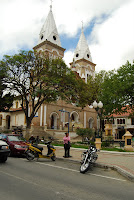.JPG)
mentions that Francisco and her conspired often in mischivious play together and her mother laughs as she recals these times with her daughter. Part of the bond brother and sister created stems from the shared destiny of their bodies: they were born with the same physical condition in which their legs were initialy twisted, folded upwards and crossed with their heels facing downwards. Between the two of them, they summed a total of 19 surgeries. But her last two surgeries have been emotionally more difficult for Karina since she does not have her brother´s companionship. “I have stopped doing a lot of things becasue I am afraid...and people tell me-you used to be strong before!” Her voice breaks and she lowers her gaze. Leonor looks at her daughter with tender eyes, her silent yet solid presence is enough to give Karina the strength she needs to continue speaking. Karina goes on, her voice choked with emotion: “I am afraid to let go of my crutches completeley and walk on my own because I fear waking up dead like my brother...”
After nine surgueries, Karina only has one more left. She shows us her crooked pinky, a symptom of her disability, while her mother smiles knowingly; she is familiar with every minute aspect of her children´s bodies. At the moment, Karina is walking on crutches and at times special boots that help her stay ubright. At the age of 13, she took her first independent steps:
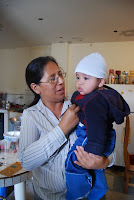.JPG)
“It is like I was born again, like a baby who stopped crawling and started walking.” But the long winding path that lead her to stand on her own two feet is marked with rock like obstacles, those that society puts in the way of those who do not conform or match with what is considered normal and imperative: a healthy, whole body. As she recounts her experiences with discrimination, her expression, which moments before reflected a nostalgic joy, is now serious, and somewhat bitter: “On the one side it is ugly to live this way, because I need help from other people to do things...I need help to get on the bus and it offends me when the druivers yell at me: “Go fast! Move! And sometimes they start driving as I am climbing the steps!”
“ I would love to be able to run” Karina states, a wistful smile on her face “ but I know there are so many dangers out there, so I prefer being like this right now, so I don´t have to confront the world because of what it has become.”
After her daughter speaks of discrimination, Leonor speaks out about the injustice and abuse that she has suffered throughout her life from her family members. She grew up in a very traditional Latino home: “My mother taught me that men have to be served and respected and that was just how it was”. She was the only womyn amongst 4 brothers. She suffered both sexual and physical abuse in her own home the age of five until she was eighteen. “My brothers could go out and play, but becasue I was a womyn, I could not go out”. Wiping her eyes, Leonor recalls the loneliness she experienced at that time. She stopped going to school and lacked friends whom she could reach out for comfort and support. Leonor recalls that her worst terror she experienced was when her brother would get home from work: “He would lock me in a room...” Leonor told her mother of the horrid violations her brother forced upon her, but till this day her mother believes Leonor invented the whole experience. As her mother speaks, Karina silently listens, her face withrawn and thoughtful.
What saved her at the time, was leaving her home to get married. Leonor met her husband working as a janitor at her mother´s work. The reason for her marriage? She responds with a certain bitter edge to her words: “ I got married to get out...he got married becasue he had his physical disabilty and never had a partner." And as her life with him unraveled, the world presented Leonor with more and more challenges to add to her already terbulent past: “My children were born with disabilities and it was up to me to confront this world along their side.” As her children grew older, more and more surgeries became necessary in order to straighten their legs and hips. Leonor spent years taking her two children in and out of hospitals with limited and at times no money whatosever.
And once again, as she did in her younger years, Leonor had to take charge. Her husband, she claimed, was barely involved in their children´s health and recoveries and the responsibility of her family´s well-being was all on her shoulders. She felt like she could not ask her husband, who was already burdened with a disability, for help. She felt alone and overwhelmed with so many necessities; her family was facing financial difficulties after paying for so many surgeries, and her own physical condition, overpowering migraines, started shadowing her days, draining her emotionally and physically. So when her pains worsened and she went to seek help, she was not surprised to find out that she had a cyst in her right ovary. When her husband, who she has been devoted to for years, showed indifference to her diagnosis she felt betrayed.: “It hurt me not have him by my side…I felt like I deserved so much more, as a womyn and as a person.” And to add salt to her wounds, her husband also hit her for the first time when she refused to have sexual relations with him. This became the tip of the iceberg she decided that her marriage was over.
With a fierce look born of years of suffering, Leonor speaks her truth: “I was not someone who was going to stay.. I left at eighteen and I said: no one is ever going to hit me again. Never again will anyone force me to have sexual relations with them. NEVER.” Karina listens to her mother’s tragic memories in silence, not daring to look up until her mother is done, as if she is afraid that if she looks, the almost tangible heavy bag of dark memories her mother has brought out of the past will also settle itself on her shoulders. Or maybe, it already has.
Leonor had to break a number of cultural taboos that she had been taught to respect throughout her life whe she left her home. “It is usually the man that leaves the house and goes with another womyn. But it was me, the womyn, that left this time.” Unfortunately, her decision had both emotional and legal ramifications. In Peru, when a womyn leaves the home, she has to wait two years to file for divorce, as opposed to the men who only has to wait one year. “So at first I waited to leave the house for the sake of my children.” she says, her mouth set in a thin stubborn line. Her decision cost her a big part of her emotional stability: she was left alone and disowned: “The day I left, I lost my home, my mother, my brothers and even my children..everything turned against me.” She could not even gather enough courage to protest this treatment, to claim her rights to see her children, a restriction put on her by her husband after she left. “Because I left our home, I had to confront reality- I am the outcast of the family... becasue I dared to belive in my dreams, becasue I believed I desereved to have an opportunity to be happy, loved. Like any other human being.”
Despite her strong and proud attitiude in the face of her obstacles, Leonor
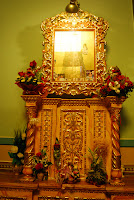.JPG)
still feels that she is tied up to her religious ubringing and that she has to remain faithful to them, even when they contradict with her actions and decisions: “There is a total divorce between religion and the world...they just don´t fit with each other.¨ Like her mother, Karina was brought up a Catholic. She is currently a part of a sect in the catholic church but decides what she will share with us is only a limited amount of information and is a bit reluctant to tell us about what occures in her church. “If I tell you about it you will think that it is like being in a movie...” she says, which arouses our curiosity as to the nature of her religious beliefs. Her mother, however, is quick to explain to us the basic idea behind religious faith: In this case, the church preaches for complete and total forgivness of any wrong or unlawful actions another human being commits¨ She says that this path is difficult and not very realistic out in the world. But she supports and respects her daughter´s religious convictions.
Both womyn granted us access to their rich past. Our minds, ears and hearts witnessed their heartful confessions, fears and desires. However, when we ask Karina about her own experiences with violence, the room suddenly darkens and an almost imperceptible chill settles over the womyn´s bodies; for the first time, mother and daughter are completely silent and cannot look
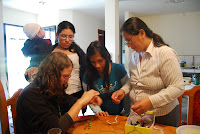.JPG)
at one another. It becomes obvious that we have touched a very sensitive nerve. Karina seems lost, she turns her head in all directions, her eyes unseeing. When she finally looks up at her mother, her gaze is tortured, wounded. In the silence, we can almost hear the strong beat of her heart accelarating in panic. Leonor, her hand pressing Karina´s for comfort, responds instead. “It is hard and for me as a mother when things hapen and you don´t expect it. You think that it can happen to the neighbor, to a stranger but not to you...” Leonor continues with a shaky voice, saying that right now they are dealing with something that happned to her daughter, something that Karina is not ready to make public. “It happend right under my nose and it hurts me trumendously...but violence happens mostly in your own home and with the people closest to you,” Leonor tells us. She is angry for the injustice of it all, for her daughters suffering, for her silence. To her, regardless of religious convitions, some sins have no forgiveness.
After some time, the womyn settle down again, their shouldres touching, their hands still entwined. They have shared anectdotes of their most diffcult moments with us almost without hesitation. And what of their dreams, their most wistful desires? Karina´s dream is to become a child psychologist, to help youngsters who have no one else to turn to. Leonor´s dream matches her creative and independent spirit: she has a passion for manual art work such as jewelry and tapestry and she envisions opening her own place, selling her work and teaching art classes.
And where is Leonor at this time in her life? How has she continued moving forward, adjusting to the extreme life changes she has experienced? The rest of Herstory continues to amaze us: after living for more than twenty years with a disabled husband and taking care of two disabled children, she moved in with a blind partner who suffers from visual impairment. She continues to see the best in her circumstances. “The person at my side supports me a lot. Because he is blind, he has a different mentality from others and more common sense.” Leonor undertands, from years of intimate experience, the life of the physicaly impaired.

We say goodbye to mother and daughter filled to the brink with the journey of words we have just taken wih them. We know that their powerful voices, their positive outlook, their understanding of each other and their great love for life as difficult as it may be, will stay with us for many years to come.
member of our team: our HD Camera (GIA) . GIA traveled from Florida to Colombia, stopping in Bogota and going to Medellin, getting lost in the airport, and finally making it to our hands. And we thought that simply getting it was the challenge until we started to skim through the manual… Thankfully, we are womyn and we know how to multi-task, that is, read electronics manuals besides our other 3 books, create a project from scratch, live it, travel, and still find a couple of hours to type this down.
mountains and is reflected in the diverse beauty of its people: Womyn, smiles, Central Markets, Doubts, seeds, tires, roads, Good-byes, rain, weight, sweat, internet, holes in socks, backpacks, camera, fights, swollen feet, Spanglish, manuals, trolley buses, sewing, adrenaline, Chuta, Dollar Bills, Border, Gringos, Quimbolitos, mountains, interviews, diarrhea, feminism, Nepalese men, Catholicism, Palo Santo, egos, swimming again, Rituals, encebollados, cooking, toilet paper, writing, cold showers, and waiting for the next moment with a lot of hootspah (ask a Hebrew speaker). ..
